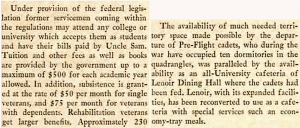
Two images from the Carolina Alumni Review of October 1945 discussing the GI Bill, reduced costs of subsistence at UNC, and Lenoir as an all University cafeteria. The General Alumni Association. 1945. “Alumni Association Plans Veteran Meetings.” Carolina Alumni Review. October 1945. 23. Accessed November 2, 2018 http://www.carolinaalumnireview.com/carolinaalumnireview/194510/MobilePagedReplica.action?pm=2&folio=42#pg23
The University of North Carolina Alumni Review Article from October 1945 reveals the way of life at the University after the GI Bill was passed following the end of World War II and focuses on the accommodations made for veterans specifically at UNC. After being passed in 1944, the GI Bill facilitated the reintegration of veterans into society after having served in World War II by offering financial aid for housing, education, and other necessities [1]. This article demonstrated how this nationwide act influenced life and the way in which people obtained food at UNC. The GI Bill provided subsistence for $50 per month to single veterans and $75 per month to veterans with dependents [2]. As a result of the benefits provided for education, food, and housing, the student population at UNC alone increased to 6,800 students, which was 2,400 more students than any previous year [3]. This program is incredibly important to the food story in Chapel Hill because it allowed for an increased student population and contributed to the growth of the school as a whole. Since the University also provided subsistence to the families of married veterans living on campus, more veterans were able to attend, allowing the University to grow and develop.
Additionally, to accommodate the influx of students that enrolled as a result of the increased benefits of education and subsidies for subsistence for veteran students with and without families, the University changed the way in which the dining halls functioned. In particular, the Alumni Review article discussed that Lenoir Dining hall became “university-wide” and was no longer limited to certain students, such as the Pre-Flight Cadets [4]. This increase in the scope of food service for the dining hall reveals a shift in the way all students and those living on campus obtained food. Additionally, other accommodations were implemented in Lenoir, such as Economy tray meals, allowing for veterans to obtain food under the GI Bill [5]. This article conveys how the post World War II policies impacted the University and its food policies, economics, and services on campus.
Footnotes
[1] Adamczyk, Joseph. “GI Bill.” In Encyclopedia of Activism and Social Justice, edited by Gary L. Anderson and Kathryn G. Herr, 617. Thousand Oaks, CA: SAGE Publications, Inc., 2007. Accessed November 2, 2018. doi: 10.4135/9781412956215.n354.
[2] The General Alumni Association. 1945. “Alumni Association Plans Veteran Meetings.” Carolina Alumni Review. October 1945. 23. Accessed November 2, 2018 http://www.carolinaalumnireview.com/carolinaalumnireview/194510/MobilePagedReplica.action?pm=2&folio=42#pg23
[3] Fletcher, Stephen. “The Best of Times: The ‘Golden Era” at UNC (1945-1950).” North Carolina Miscellany. August 21, 2014. Accessed November 2, 2018. https://blogs.lib.unc.edu/morton/index.php/2014/08/the-best-of-times-the-golden-era-at-unc-1945-1950/.
[4] Ibid.
[5] Ibid.
Devyn Scott